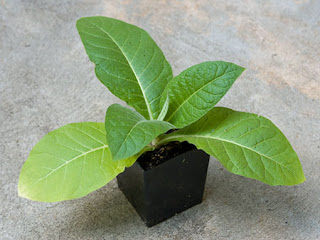
A University of Queensland PhD scholar is examining the health effects of chewing wild tobacco plants by Central Australian Aboriginal women during pregnancy.
According to Angela Ratsch, over 30 percent of Aboriginal women who give birth at Alice Springs Hospital regularly chew wild tobacco or 'pituri', which is found growing across regional and rural areas of Australia.
The chewing of Australian wild tobacco plants by Aboriginal and Torres Strait Islander populations is common in the central regions of Australia, where it is chewed in order to extract the nicotine content.
It is also a common practice amongst developing nations and indigenous populations throughout the world, with more women chewing tobacco than smoking it.
In Canada, approximately 58 percent of Inuit women chew during pregnancy, while in Cambodia, midwives recommend the use of chewing tobacco for pregnant women to reduce symptoms of morning sickness.
Ms Ratsch said little research had been done on the effects of chewing wild tobacco during pregnancy.
“Cigarette smoking has been clearly linked as an independent factor to low birth weight and premature birth, but it is unknown whether the outcome of chewing ‘pituri' is also a contributing factor,” she said.
“Babies born to Aboriginal and Torres Strait Islander mothers who smoke are more than 250 grams lighter than those born to Aboriginal and Torres Strait Islander mothers who do not smoke.”
Statistics show that the Australian Aboriginal and Torres Strait Islander maternal mortality ratio is almost three times higher than for Australian non-Aboriginal and Torres Strait Islander women.
Similarly, Aboriginal and Torres Strait Islander infant mortality rates are two to three times higher than for non-Aboriginal and Torres Strait Islander infants, with the highest rate in the Northern Territory (15.6 per 1000 live births).
Ms Ratsch's research looks at the chemical properties of chewing tobacco in pregnant women and their unborn babies.
It builds on Aboriginal and Torres Strait Islander knowledge of native plants and practices to determine whether a relationship exists between the chewing of pituri during pregnancy and poor maternal and neonatal health outcomes.
The research is being undertaken by UQ pharmacy and midwifery researchers, and midwives in collaboration with Aboriginal health workers and Aboriginal liaison officers in Central Australia and key Aboriginal Women's Organisations; Ngaanyatjarra Pitjantjatjara Yankunytjatjara Women's Council and Alukura Central Australian Aboriginal Congress.

Комментариев нет:
Отправить комментарий